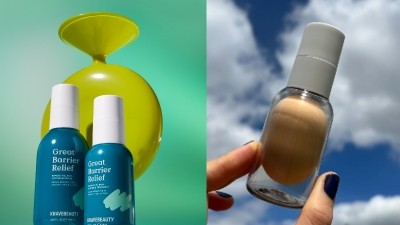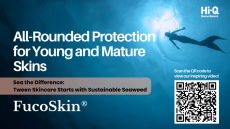The Upcycled Beauty Company banks on high consumer awareness and adoption to seize growth opportunities in Asia

In recent months, the firm has been making headway into Asia by expanding its distribution network in Indonesia, Thailand, Taiwan, Vietnam, and South Korea.
“There are several markets in Asia that are enormous. From our research, China, in particular, could be a huge market for us. We started selling to North America two years ago. It’s a very big market, and we know that China could completely eclipse that when we eventually venture into it.
“South Korea is a market leader [in cosmetics] and many other regions around the world follow after it. Trends that start off there do get picked up elsewhere, and that’s why we are putting a lot of efforts into certain markets in Asia,” Harry McIlwraith, General Manager of The Upcycled Beauty Company, told CosmeticsDesign-Asia.
In fact, Korea was one of the first markets that the company looked into, due to its established waste management and recycling system. Its upcycled ingredients are currently supplied to contract manufacturers in the country.
In addition, Anna Crovetto, the firm’s Community Lead, cited the example of Kintsugi, the Japanese art of repairing broken pottery with a mix of lacquer and powdered gold, silver or platinum.
According to Crovetto, Kintsugi reflects a “healthier attitude” towards reuse and repair, which are part of circularity and waste management.
“In the west, we’re certainly not as advanced and people not as aware [of recycling and waste reduction]. There is a level of education that we have to do within our industry and with consumers, which is why one of our key pillars is to inform and inspire.
“We have to translate that to Asia as well because even in some Asian countries, the idea of using waste or by-products in personal care is not attractive. But the region is already far ahead of us in terms of understanding the importance of reducing food waste and recycling correctly. So, it will not be a big jump to adopt the next step in sustainable beauty — beyond natural ingredients to circular processing, upcycling, zero waste, etc.,” she added.
Collaboration rather than competition
Every year, The Upcycled Beauty Company releases a free Zero Waste Beauty Report that features new innovations in the industry globally with regard to “reducing waste and making better use of that waste”.
It also spotlights news on circularity and zero waste, interesting packaging concepts and brands, and upcycled ingredient launches on its website and LinkedIn.
“We have a database on our website that talks about all the new launches that we are aware of. This is how we try to raise global awareness of the upcycling movement — promoting not just our own raw materials but also our competitors’. We like to think of them as collaborators, as we know that we’re not going to be the only upcycled ingredient manufacturer on the planet.
“Also, we are starting our own upcycled certification. Currently, there’s no recognised definition for an upcycled ingredient within cosmetics, and we are aware that many companies have different viewpoints on what an upcycled ingredient is. That’s something that we are hoping to remedy through this certification scheme,” McIlwraith explained.
The company’s aim is for the business to grow alongside the upcycling industry.
“We see many new upcycled ingredients being introduced at every trade show that we go to, so we do see the movement growing consistently. As sales of upcycled ingredients increase and the market size expands, we will hopefully get a bigger slice of the pie.”
Focus on functionality
The Upcycled Beauty Company primarily sources from the waste stream of food and beverage and agroforestry industries. Its portfolio is categorised into three parts, namely NECTA active oils, TONIQ water-soluble actives, and CRUSH exfoliating powders.
The firm’s most recent launch is Faba TONIQ, which also marks its first foray into hair care.
Made from a by-product of hummus production, Faba TONIQ is an active ingredient that contains a concentrated mix of complex carbohydrates, proteins, amino acids, peptides, and polypeptides to style and condition the hair.
It claims to provide better hair management, easier detangling, and longer-lasting styling, with the ability to retain curl even in humidity for as long as 48 hours.
“It’s important to note that an ingredient shouldn’t be added to a formula just because it’s upcycled or trendy. It should still have a function, be it anti-redness or anti-ageing etc. All our raw materials are backed by science and data. We engage independent contract research organisations (CROs) and well-known testing houses across Europe to do studies.
“We believe that using upcycling methods to make cosmetic ingredients will be the norm in future. Sustainability and circularity will be the baseline of development, and the focus will be on functionality,” said Crovetto.
The company is constantly working on new innovations as well as enhancing its present offerings.
“We are looking to introduce new raw materials that have efficacy for hair, and also add new claims data for some of our existing ingredients, such as Gin TONIQ and Barley TONIQ.
“By the next in-cosmetics Global in April next year, we hope to showcase new ingredients or new test results, and for the certification scheme to be at least at a pilot stage where we can start working with third-party manufacturers.”

![[Getty Images]](/var/wrbm_gb_food_pharma/storage/images/_aliases/wrbm_medium/publications/cosmetics/cosmeticsdesign-asia.com/china/latest-developments-in-china-s-booming-beauty-market3/17870827-1-eng-GB/Latest-developments-in-China-s-booming-beauty-market.jpg)

















